By Candace Phillips
Calls for unity and an appeal for support to ensure the survival of Afro-Guyanese culture were sounded as spiritual and cultural activities ushered in Emancipation Day here.
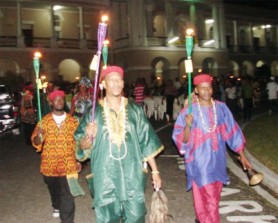
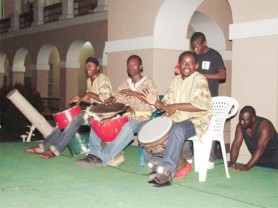
On Saturday night, the National Emancipation Trust held its annual event in the forecourt of Parliament Buildings where activities included drumming, verse speaking and singing. The crowd was asked to reflect on African history, struggles and achievements while Brother Ishmael urged the authorities to explore ways of dealing with the issue of ancestral lands.
That night too, for the first time, a candlelight parade was led through the compound of Parliament Buildings. The parade formed part of the activities hosted by the African Cultural and Development Association (ACDA) and began in front of Demico House, where about 200 persons attired in African wear formed the procession. However, as it moved along Brickdam, they were joined by other persons resulting in a 300 strong contingent singing songs and chanting “freedom” as they made their way to the Square of the Revolution.
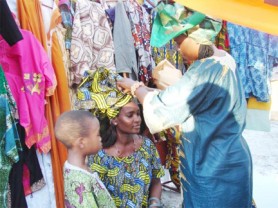
“Heading back east is significant of our ancestors when they came from the villages and they all culminated at the Parliament Buildings to hear the Declaration of Emancipation being read. And after it was read, they returned back to their villages to celebrate so we are going up eastward as they did to return to celebrate,” said Andrew Irving of the Santeria church, the main mover behind the parade. He said while it was not feasible to reach the East Coast, “the 1763 monument has been used as a central place for our ceremonies, our rituals and even rejoicing.” Brickdam, Irving said, has special significance since their ancestors built it using cobblestones thus giving it, its current name.
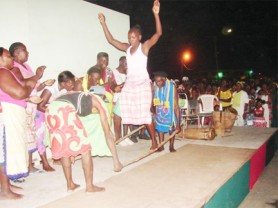
Demico is also significant, since according to Irving, their ancestors were held captive in holding cells beneath the pavement where many of them died. The location was chosen “to honour and bring them alive again in us that we can fight this struggle,” he said. He said that the parade passed through the Parliament compound at the request of the Emancipation Trust.
Upon arrival at the Square, where many others had assembled, the candles used during the parade were placed at the base of the 1763 Monument. The audience was then treated to dances and music by Surinamese Maroons and a Venezuelan group, whose involvement was made possible by the Venezuelan Embassy.
Irving later presided over a Libation
Ceremony in honour of African ancestors. At an altar made of palm leaves, and surrounded by items such as sweets, high wine, a cutlass and calabashes, among others, the participants sang, chanted, danced around, paid homage, prayed and asked for the intervention of their ancestors to help them find strength, courage and the will to fight oppression and break the chains which shackled them.
A libation was then poured for their ancestors; attendees called several names including those of late President, Forbes Burnham and former Working People’s Alliance co-leader, Dr. Walter Rodney. Irving had earlier said that the major challenge facing African Guyanese was a lack of unity which resulted from them being “… disconnected from their spirituality, from their culture and their tradition which teaches them how to go about life, how to achieve and be the best that they can be.”
Calls for unity were also echoed by Leader of the People’s National Congress Reform, Robert Corbin and Dr Richard Van-West Charles.
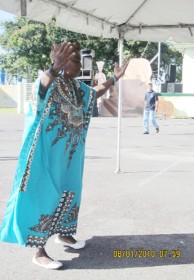
Corbin told the crowd that he would leave three words with them: “unity, determination and effective organisation.” He explained that these words formed the basis from which their ancestors were able to break the bonds of slavery and these qualities should be their guide in 2010.
“We have to learn from them (our ancestors) in terms of courage and strength they possessed,” Van-West Charles added. “Unless we can come together, we will be enslaved further,” said Van-West Charles adding that the key word as they move forward is hard work.
In wrapping up the libation ceremony, Irving lamented the lacklustre financial and material support for the week of prayers outside Demico on Croal Street and the libation at the Square of the Revolution. He asked the crowd if they were proud of the quality of the emancipation celebrations; to which they replied “no.” Irving warned the audience that if they continue to provide insufficient assistance, their cultural and spiritual preservation would be “washed away.”
The Surinamese contingent also participated in the libation ceremony at the Square of the Revolution and the proceedings ended with a symbolic show of unity between Irving and a representative of the Maroons.
Meantime, a sunrise church service in observance of Emancipation Day was held at the National Park yesterday where attendees sang songs of worship and praise and gave appreciation to their ancestors.
The service, which was organised by the Guyana United Apostolic Mystical Council, saw attendance by about 45 persons richly attired in African wear. According to Lennox King, a council member of the organisation and who presided over the event, “before you do anything, we seek the intervention of the creator.”
“As the sun rises, supplication will rise up so on this day, it can be one of peace, joyousness and prosperity where blessings can be bestowed upon us by the creators,” he said. King told the attendees that “today is a new day, let us understand that we have to move together or find ways of working together.”




